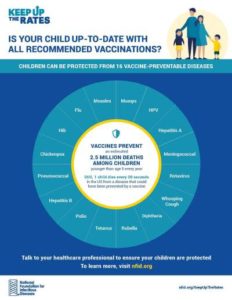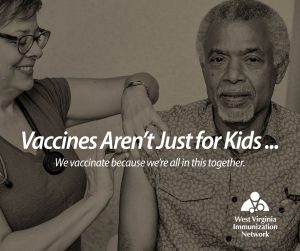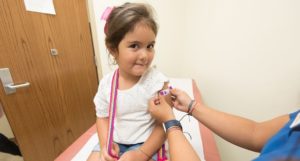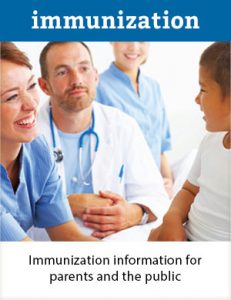
There is a great deal of information available online to help parents learn more about vaccination. The sites listed below offer accurate, science-backed information about immunization and vaccine-preventable diseases…
General immunization information:
- The Centers for Disease Control and Prevention
- The Immunization Action Coalition
- The History of Vaccines
- WV Division of Immunization Services
Childhood Immunizations
Adolescent Immunizations
Adolescent Immunization:
Unfortunately, (and contrary to their belief!) teenagers are not invincible. Their immune systems are not prepared to fight every infection. Although your teen has been introduced to many viruses and bacteria, either through illness or immunizations, yet their immune systems may not be prepared to fight every infection. Here’s why:
Fading immunity: Despite being immunized against diphtheria, tetanus, and pertussis, protection provided by these vaccines is not life-long. No previous exposure: Vaccines work best when they are introduced before an individual’s first encounter with the virus, so that protective immunity is in place before an exposure. Social habits: Unfortunately, the new experiences they seek – sleepaway camps, college dorms, and nightclubs – are often the same ones that increase their risk of infections with bacteria such as meningococcus. Changing viruses: Like children 6 months of age and older and most adults, adolescents and teens should get a yearly influenza vaccine. Because the virus changes so rapidly from season to season, the influenza vaccine from the previous year may not provide immunity.
- 10 Reasons For Teens To Get Vaccinated
- All Kid’s Need Hepatitis B Shots!
- When Do Preteens Need Vaccines?
- When Do Teens Need Vaccines?
- HPV Vaccine: A Guide for Young Adults
- Human Papillomavirus: A Parent’s Guide to Preteen and Teen HPV Vaccination
- Vaccines For Your Preteen
- National Foundation for Infectious Diseases
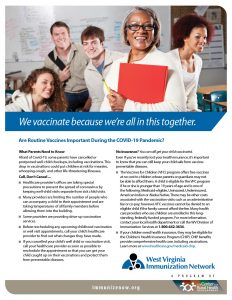
We Vaccinate Flyers for Parents 3
Adult Immunizations
Adult Immunization:
Getting immunized is a lifelong, life-protecting job. Adults are 100 times more likely than children to die of diseases that vaccines can prevent. Each year in the United States, vaccine-preventable diseases claim the lives of hundreds of children and tens of thousands of adults. Adults often don’t get vaccines because they don’t think they need them, they are worried about how they are going to pay for them, or they typically haven’t been encouraged to get them. Talk with your healthcare provider about which vaccines you need and when you should be vaccinated.
- When Do Adults Need Vaccines?
- National Foundation for Infectious Diseases
- Vaccines and Adults: A Lifetime of Health Booklet
- 10 Reasons To Get Vaccinated
- Adults with Chronic Diseases: Chronic health conditions can increase your risk of serious complications from certain vaccine-preventable diseases, including long-term illness, hospitalization, and even death.
Immunizations During Pregnancy
Immunization for Pregnant Women:
Vaccines can help protect both you and your baby from vaccine-preventable diseases. During pregnancy, vaccinated mothers pass on infection-fighting proteins called antibodies to their babies’. Antibodies provide some immunity (protection) against certain diseases during their first few months of life when your baby is still too young to get vaccinated. it also helps provide important protection for you throughout your pregnancy.
Immunizations for Travelers
Vaccines protect travelers from getting diseases abroad that may not normally be found in the United States. Getting vaccinated against certain diseases is one of the most effective things you can do to protect your health abroad.

